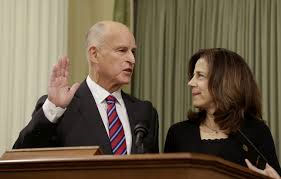As Republicans prepare to vote on the Keystone pipeline, a "jobs" bill that will supposedly create 42,000 jobs (indirect and temporary), Governor Jerry Brown of California is embarking on a program that puts that to shame.
This week, construction begins on the first high speed rail project in the US, which Republicans have outright rejected. While Keystone will create about 2000 direct jobs for the short time it takes to build the pipeline, this first segment of high speed rail will carry people (not the dirtiest of oils) between Los Angeles and San Francisco in 3 hours.
The $4 billion cost for this first segment (supported through federal grants) is half of the $8 billion Keystone pipeline and puts 100,000 people to work.
In Brown’s inaugural speech for his fourth term in office, he spoke about success in balancing the budget, reforming school and criminal justice systems, the raise approved on the minimum wage, millions newly covered by health insurance … and then … something we too rarely hear from politicians …

"Finally, neither California nor indeed the world itself can ignore the growing assault on the very systems of nature on which human beings and other forms of life depend. Edward O. Wilson, one of the world’s preeminent biologists and naturalists, offered this sobering thought:
‘Surely one moral precept we can agree on is to stop destroying our birthplace, the only home humanity will ever have. The evidence for climate warming, with industrial pollution as the principal cause, is now overwhelming. Also evident upon even casual inspection is the rapid disappearance of tropical forests and grasslands and other habitats where most of the diversity of life exists. We are needlessly turning the gold we inherited from our forebears into straw, and for that we will be despised by our descendants.’
And then the big announcement:
With California on track to reach 33% renewable energy by 2020, a cap-and-trade system that prices carbon, and strong incentives for cleaner transportation, "it is time to establish our next set of objectives for 2030 and beyond," says Brown.
"We must demonstrate that reducing carbon is compatible with an abundant economy and human well-being. So far, we have been able to do that."
Toward that end, Brown proposes 3 goals for 2030:
- 50% renewable electricity!
- 50% cut in petroleum use in cars and trucks
- Doubled efficiency in existing buildings and cleaner heating fuels.
"We must also reduce the relentless release of methane, black carbon and other potent pollutants across industries. And we must manage farm and rangelands, forests and wetlands so they can store carbon. All of this is a very tall order. It means that we continue to transform our electrical grid, our transportation system and even our communities.
I envision a wide range of initiatives: more distributed power, expanded rooftop solar, micro-grids, an energy imbalance market, battery storage, the full integration of information technology and electrical distribution and millions of electric and low-carbon vehicles. How we achieve these goals and at what pace will take great thought and imagination mixed with pragmatic caution. It will require enormous innovation, research and investment. And we will need active collaboration at every stage with our scientists, engineers, entrepreneurs, businesses and officials at all levels.
Taking significant amounts of carbon out of our economy without harming its vibrancy is exactly the sort of challenge at which California excels. This is exciting, it is bold and it is absolutely necessary if we are to have any chance of stopping potentially catastrophic changes to our climate system."
Thus, Brown is building on California’s success, ranked #1 on installed solar and #3 on wind, and in the process of creating the first commercial market for energy storage.
Read his speech:
